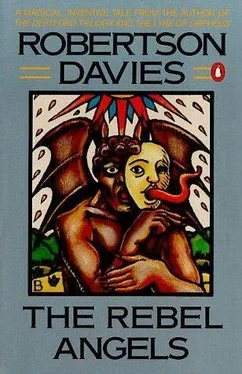Robertson Davies - The Rebel Angels
Здесь есть возможность читать онлайн «Robertson Davies - The Rebel Angels» весь текст электронной книги совершенно бесплатно (целиком полную версию без сокращений). В некоторых случаях можно слушать аудио, скачать через торрент в формате fb2 и присутствует краткое содержание. Жанр: Триллер, на английском языке. Описание произведения, (предисловие) а так же отзывы посетителей доступны на портале библиотеки ЛибКат.
- Название:The Rebel Angels
- Автор:
- Жанр:
- Год:неизвестен
- ISBN:нет данных
- Рейтинг книги:5 / 5. Голосов: 1
-
Избранное:Добавить в избранное
- Отзывы:
-
Ваша оценка:
- 100
- 1
- 2
- 3
- 4
- 5
The Rebel Angels: краткое содержание, описание и аннотация
Предлагаем к чтению аннотацию, описание, краткое содержание или предисловие (зависит от того, что написал сам автор книги «The Rebel Angels»). Если вы не нашли необходимую информацию о книге — напишите в комментариях, мы постараемся отыскать её.
The Rebel Angels — читать онлайн бесплатно полную книгу (весь текст) целиком
Ниже представлен текст книги, разбитый по страницам. Система сохранения места последней прочитанной страницы, позволяет с удобством читать онлайн бесплатно книгу «The Rebel Angels», без необходимости каждый раз заново искать на чём Вы остановились. Поставьте закладку, и сможете в любой момент перейти на страницу, на которой закончили чтение.
Интервал:
Закладка:
I knew I was going to like Prof. The Rev. Darcourt. He seemed to think that learning could be amusing, and that heavy people needed stirring up. Like Rabelais, of whom even educated people like Parlabane had such a stupid opinion. Rabelais was gloriously learned because learning amused him, and so far as I am concerned that is learning's best justification. Not the only one, but the best.
It is not that I wanted to know a great deal, in order to acquire what is now called expertise, and which enables one to become an expert-tease to people who don't know as much as you do about the tiny corner you have made your own. I hoped for a bigger fish; I wanted nothing less than Wisdom. In a modern university if you ask for knowledge they will provide it in almost any form – though if you ask for out-of-fashion things they may say, like the people in shops, "Sorry, there's no call for it." But if you ask for Wisdom – God save us all! What a show of modesty, what disclaimers from the men and women from whose eyes intelligence shines forth like a lighthouse. Intelligence, yes, but of Wisdom not so much as the gleam of a single candle.
That was what chained me to Hollier; I thought that in him I saw Wisdom. And as Paracelsus said – that Paracelsus with whom I had to be acquainted because he was part of my study of Rabelais: The striving for wisdom is the second paradise of the world.
With Hollier I truly thought that I would have the second paradise, and the first as well.
The New Aubrey II
Is it ever a kindness to appoint someone an executor? It is evidence of trust, certainly, but it may become a tedious servitude. Hollier and I were swept more and more into concern with Cornish's affairs, at cost of time and energy that we needed for our own work. There was a note in the will that when everything was dealt with each of the advisers or sub-executors might choose 'some object that especially pleases him, provided it has not been designated as a bequest or portion of a bequest elsewhere". But this made our work more vexatious, because we were continually coming upon things we would like to have and finding that they had been earmarked for somebody else. And young Cornish's lawyers told us that we might not choose or remove anything until all bequests had been dealt with. We were like poor relatives at the Christmas Tree of rich children.
Rich, and not as grateful as I thought they should be. The big recipients were glad enough to take what they liked, but made it clear that some things that were in their portion didn't especially please them and weren't welcome.
The National Gallery was one of these. Cornish had left them dozens of canvases, but he had stipulated that the Canadian pictures were to be kept together and placed on permanent exhibition, as the Cornish Bequest. The Gallery people said, reasonably enough, that they liked to show their pictures in a historical context, and Cornish's Krieghoffs and other early things ought to go with their exhibitions of Early Canadian Painting; they didn't want primitives spotted about all over their galleries. They said also that they didn't think some of the modern pictures first-rate, whatever Cornish may have thought, and simply couldn't say they would put them on permanent show. If there was to be a Cornish Bequest, Cornish might have discussed it with them beforehand; or might have thought of leaving money to build a special gallery for it; even if he had done so, they had no land on which to build such a gallery. The correspondence was courteous, but only just, and there were frequent hints that donors could be peremptory and inconsiderate, and that anybody without a degree in Fine Arts was rather an amateur.
Hollier didn't like that. He is a man of strong feelings and loyalties, and he thought Cornish's memory was being insulted. I, with my tedious capacity to see both sides of a question, wasn't so sure. McVarish made Hollier even angrier by being frivolous, as if the will and Cornish's wishes didn't matter very much.
"All donors and benefactors are crazy," he said. "What they want is posthumous fame and posthumous gratitude. Every college and faculty on this campus could tell a bloody tale if you asked for it. What about the family that earmarked the income from a million to found a chair of internal medicine, and then craftily snatched it back when they didn't like the politics of the third man appointed to it – years later? What about that old bastard who gave a historical library to the University Library, and frowned everybody down and demanded an honorary degree even when it was shown that the books weren't really his, but the property of a foundation he directed? What about old Mahaffy, who gave a bundle for a Centre for Celtic Studies, on condition that Celtic Studies meant Irish Studies and the Scots and the Welsh and the Bretons could all go and bugger themselves? What about that miserable old hound who founded a lectureship, insisting that it be initiated in his lifetime and that the University foot the bill till he died, and then told the President, years later, with a grin on his face, that he'd changed his mind, and didn't like the lectures anyway? Benefaction means self-satisfaction, nine times out of ten. The guile and cunning that enable benefactors to get their hands on the dough make it almost impossible for them to relinquish it, at the hour of death. Even our dear friend Cornish – a very superior specimen, as we all know – can't entirely relax his grip. But what does it matter, anyhow? If the National Gallery doesn't want a picture, give it to the Provincial Gallery, who are getting lots of pictures anyhow. What does another daub or so matter, in the long run? You know what the will says: anything that's left over after specific pictures have gone to the right places may be disposed of at the discretion of Cornish's executors. And that means us. The nephew won't know and won't care. Our job is to cut up the melon and get these apartments emptied."
But Hollier wouldn't hear of that. I had known him for years in a casual way, but I had never seen very deeply into him. He seemed to me to have more conscience than is good for any man. A powerful conscience and no sense of humour – a dangerous combination.
McVarish, on the other hand, possessed rather too much humour. People tend to talk as if a sense of humour were a wonderful adjunct to a personality – almost a substitute for common sense, not to speak of wisdom. But in the case of McVarish it was a sense of irresponsibility, a sense of the unimportance of anybody else's needs or wishes if they interfered with his convenience; it was a cheerful disguise for the contempt he felt for everybody but himself. In conversation and in the affairs of life he greatly valued what he called "the light touch"; nothing must ever be taken seriously, and the kind of seriousness Hollier displayed was, so McVarish hinted pretty broadly, ill-bred. I like a light touch myself, but in McVarish's case it was too plainly another name for selfishness. He didn't care about carrying out Cornish's wishes as well as could be managed; he just liked the importance of being an executor to a very rich and special man, and of hob-nobbing with people from the galleries who met his exacting standards. As has so often been my lot, I had to play peacemaker between these irreconcilables.
My special problem was with archivists. The University Library, not content with the promise of a splendid haul of manuscripts and rare books, wanted all Cornish's papers. The National Library in Ottawa, which had been left nothing, put in a courteous but determined request for Cornish's letters, records, papers, everything that could be found relating to his career as a collector and patron. The two libraries squared off and began, politely but intensely, to fight it out. Cornish had never, I suppose, thought that his old letters and junk might be of any interest to anyone; he kept no records, his method of filing was to throw stuff into cardboard cartons in whatever order came to hand; his notebooks – preserved simply because he never threw anything away – were a muddle of scribbled reminders of appointments, notes of unspecified sums of money, addresses, and occasional words and phrases that had meant something to him at some time. I looked through them superficially and found an entry in a book which, as it was not filled, I presumed must have been his last: it said, "Lend McV. Rab. MS April 16".
Читать дальшеИнтервал:
Закладка:
Похожие книги на «The Rebel Angels»
Представляем Вашему вниманию похожие книги на «The Rebel Angels» списком для выбора. Мы отобрали схожую по названию и смыслу литературу в надежде предоставить читателям больше вариантов отыскать новые, интересные, ещё непрочитанные произведения.
Обсуждение, отзывы о книге «The Rebel Angels» и просто собственные мнения читателей. Оставьте ваши комментарии, напишите, что Вы думаете о произведении, его смысле или главных героях. Укажите что конкретно понравилось, а что нет, и почему Вы так считаете.












